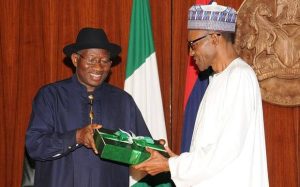
JONATHAN DENIES ACCUSING BUHARI OF BOKO HARAM LINKS, SAYS REMARKS WERE ‘MISREPRESENTED’
By: Sefiu Ajape
Former President Goodluck Jonathan has denied reports alleging that he accused the late President Muhammadu Buhari of having links with Boko Haram, insisting that his comments were “grossly misrepresented.”
In a statement issued on Saturday by his Special Adviser on Media and Public Affairs, Ikechukwu Eze, Jonathan clarified that he never “suggested, implied, or insinuated that President Buhari had any connection with Boko Haram or that he supported the group in any form.”
While speaking on Friday at the public presentation of ‘Scars’, a book written by former Chief of Defence Staff Lucky Irabor, Jonathan had recalled that Boko Haram once nominated Buhari, his successor, to negotiate on their behalf with the federal government.
Jonathan, who served as Nigeria’s president from 2010 to 2015, explained that the insurgents mentioned Buhari after his administration established committees to explore dialogue with the terrorist group.
However, Garba Shehu, former spokesperson to Buhari, dismissed the claim as “false and politically motivated.”
Eze, in his statement, said Jonathan’s remarks were part of “a broader discussion on Nigeria’s security challenges” and were meant to illustrate “the deviousness and manipulative strategies employed by Boko Haram in their early years.”
“The attention of the Office of Former President Goodluck Ebele Jonathan has been drawn to misleading reports circulating in sections of the media suggesting that Dr Jonathan alleged that Boko Haram nominated the late President Muhammadu Buhari, GCFR, to represent them in dialogue with the Federal Government, and therefore this made him somehow complicit in the Boko Haram crisis,” the statement reads.
He further explained that Jonathan’s reference was to “a well-documented episode when various individuals and factions falsely claimed to represent the terrorist group and purported to name prominent Nigerians as possible mediators, without those individuals’ knowledge or consent.”
According to him, “The point Dr Jonathan sought to make was that Boko Haram, in its characteristic deceit, often invoked the names of respected public figures to sow confusion, exploit political divisions, and undermine public confidence in government.”
“His comments were therefore an illustration of the group’s duplicity, not an accusation against the late former president or any individual, for that matter.”
Eze added that Jonathan’s position was that “if indeed Buhari was their choice negotiator, why didn’t Boko Haram expeditiously bring their evil terrorist agenda to an end when the retired General became president?”
He also emphasized that “Dr Jonathan recognises that President Muhammadu Buhari, like every patriotic Nigerian, stood firmly against terrorism and was himself a target of Boko Haram violence. Both men, during their respective tenures, shared a common commitment to restoring peace and stability to Nigeria.”
Eze urged Nigerians to “disregard any misinterpretation remarks,” noting that the former president remains committed to peace, unity, and the strengthening of democratic values in Nigeria.

